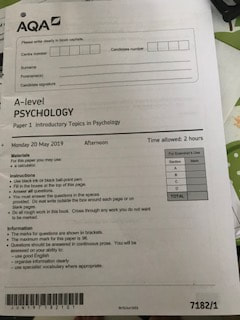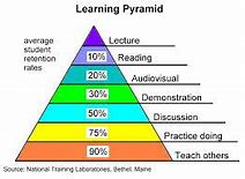So what is this "levels of revision" and how do I use it?

What is it?
The "levels of revision" is an effective way of helping students to learn how to revise. It was designed in the BHASVIC psychology department, and is based on psychological research and theory.
It centers on the models of memory that you will learn for the paper 1 cognitive psychology topic. The multi-store model states that you only need maintenance rehearsal (just repeating info) to keep it in short term memory (STM) and if you do this or a prolonged period of time for it to go into your long term memory (LTM) however the levels of processing research has shown us that it is not the case. To really learn information you need to give some meaning to the material and elaborate on it. Just reading a sentence over and over doesn't give it an meaning or make it unique or interesting so you SHOULD NOT do this when you are revising.
ORGANISE-READ-ENGAGE-LEARN-PRACTICE
The "levels of revision" is an effective way of helping students to learn how to revise. It was designed in the BHASVIC psychology department, and is based on psychological research and theory.
It centers on the models of memory that you will learn for the paper 1 cognitive psychology topic. The multi-store model states that you only need maintenance rehearsal (just repeating info) to keep it in short term memory (STM) and if you do this or a prolonged period of time for it to go into your long term memory (LTM) however the levels of processing research has shown us that it is not the case. To really learn information you need to give some meaning to the material and elaborate on it. Just reading a sentence over and over doesn't give it an meaning or make it unique or interesting so you SHOULD NOT do this when you are revising.
ORGANISE-READ-ENGAGE-LEARN-PRACTICE

Level one-organise
Have you got everything ready?
Before you can start revising you need to make sure you're organised and ready. Have you got all of your notes and the relevant pack printed out or saved on line? Have you got a space to work in?
How long until your exam?
Are you revising for a mini-mock meaning you've only got 1 week or is this for your progression exam and you've got a whole month?
However long you have you need to plan exactly when you are going to revise each bit of the topic so you get it all covered before your actual exam/test.
It is also really important that you revise in chunks so a sub-section of the topic at a time.
Have you got everything ready?
Before you can start revising you need to make sure you're organised and ready. Have you got all of your notes and the relevant pack printed out or saved on line? Have you got a space to work in?
How long until your exam?
Are you revising for a mini-mock meaning you've only got 1 week or is this for your progression exam and you've got a whole month?
However long you have you need to plan exactly when you are going to revise each bit of the topic so you get it all covered before your actual exam/test.
It is also really important that you revise in chunks so a sub-section of the topic at a time.

Level two-read or listen
You can't learn unless you understand
Don't just open your pack and start making revision notes, you need to make sure you actually understand the sub-topic first.
How?
Simply read the relevant section of the pack without highlighting or annotating. If you still don't fully understand the material or would like to hear somebody else talking through it you can click on one of the audio files and listen to one of your teachers talking you through the ao1 of the subtopics. Sometimes it helps to hear somebody else explaining the material.
You can't learn unless you understand
Don't just open your pack and start making revision notes, you need to make sure you actually understand the sub-topic first.
How?
Simply read the relevant section of the pack without highlighting or annotating. If you still don't fully understand the material or would like to hear somebody else talking through it you can click on one of the audio files and listen to one of your teachers talking you through the ao1 of the subtopics. Sometimes it helps to hear somebody else explaining the material.

Level three-engage
Make it memorable!
Now you have a good understanding of the sub-topic its time to start to elaborate on this understanding to start to begin to learn it.
We all elaborate in different ways
This level is really personal to you and will depend on your learning style.
Some suggestions are mind-maps, flashcards, posters, creating on-line summary notes or filling in department revision sheets.
A set of revision notes does not = learning
Just because you have made a beautiful mind-map on Schaffer's stages doesn't mean you know Schaffer's stages! You are only just beginning to learn it.
MAKING QUIZLETS ARE NOT LEVEL THREE because it doesn't allow you to make detailed enough notes.
Make it memorable!
Now you have a good understanding of the sub-topic its time to start to elaborate on this understanding to start to begin to learn it.
We all elaborate in different ways
This level is really personal to you and will depend on your learning style.
Some suggestions are mind-maps, flashcards, posters, creating on-line summary notes or filling in department revision sheets.
A set of revision notes does not = learning
Just because you have made a beautiful mind-map on Schaffer's stages doesn't mean you know Schaffer's stages! You are only just beginning to learn it.
MAKING QUIZLETS ARE NOT LEVEL THREE because it doesn't allow you to make detailed enough notes.

Level four-learn
My flashcards look amazing but how do I learn them?!
This is again personal to you to but it's best to try a variety of techniques to really embed that information into your LTM.
Suggestions include:
-Cover over the section you are learning and see if you can remember what it says, keep doing this with the same section until you know all the info without looking.
-Get somebody to test you! This is where your level three comes in handy as you can give your notes to anybody and they simply ask you questions from your mind-maps or flashcards.
-Use our tracking tests- We have mini tests that you can use to quickly check your knowledge and self mark.
- Use sites like quizlet- You can make your own or use ones already prepared by us.
|
-Teach somebody- Research shows us that if you teach other people the information you need to learn then the average retention rate is 90% compared to 10% if you just read it or 20% if you listen to it (that is why these are only level 2). This technique works because if you can explain it then you really understand it! Nobody to teach? Tape yourself or just teach the wall!
-Fill out the department revision sheets again but this time with no notes. If you can do this without any support then you know the topic! |

Level five- practice (exam skills)
Its all about the exam!
Now you really know the ao1 and ao3 for your subtopic you need to see if you can apply this knowledge to the exam questions. The exam questions can be tricky so this is a vital last step in completing your revision.
But there's not that many exam papers
It's true, there have only been 3 actual Psychology exams. You can access these as whole papers with mark schemes from the website under "past papers" or we have organised them per topic and these can be found under the level 5 section of the relevant topic.
What else can I use?
We have made up sets of level five questions for you. Before a mini-mock ask your teacher which set of level five questions to do as some of the level five sets are designed to help to improve your skills for your specific mini-mock exam.
You will also have access to you tube clips and resources specifically designed to help you with tricky essays questions and these will be in the relevant topic areas.
That's it! Now you are ready to revise.
Good luck, but you won't need luck if you do your levels 1-5!
Its all about the exam!
Now you really know the ao1 and ao3 for your subtopic you need to see if you can apply this knowledge to the exam questions. The exam questions can be tricky so this is a vital last step in completing your revision.
But there's not that many exam papers
It's true, there have only been 3 actual Psychology exams. You can access these as whole papers with mark schemes from the website under "past papers" or we have organised them per topic and these can be found under the level 5 section of the relevant topic.
What else can I use?
We have made up sets of level five questions for you. Before a mini-mock ask your teacher which set of level five questions to do as some of the level five sets are designed to help to improve your skills for your specific mini-mock exam.
You will also have access to you tube clips and resources specifically designed to help you with tricky essays questions and these will be in the relevant topic areas.
That's it! Now you are ready to revise.
Good luck, but you won't need luck if you do your levels 1-5!
